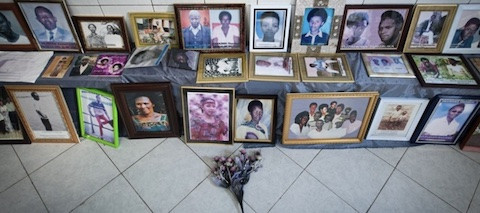
GCED Basic Search Form
Quick Search
You are here
News

At the primary school that Freddy Mutanguha attended, teachers would make Tutsi children stand up in class and verbally abuse them as “cockroaches” and “snakes”, decades-old dehumanizing language laying the foundations of the future genocide. As a child, Mr. Mutanguha went home to his mother, a teacher at the school, and asked her why she would choose to be Tutsi.
“We lived in a country with fear. All adults have horrible experiences of discrimination and many parents actually were afraid at the future for the children. From that hate speech, many Tutsi were killed,” said Mr. Mutanguha, a survivor and now Executive Director of the Aegis Trust, an international NGO working to prevent genocide and mass atrocities. He lost both parents, his four sisters and members of his extended family in the murders.
Beginning on 7 April 1994, more than 1 million people were killed within 100 days, the overwhelming majority of whom were Tutsi and including moderate Hutu and Twa people. On the International Day of Reflection on the 1994 Genocide against the Tutsi in Rwanda, UNESCO, the Permanent Representative of Rwanda to UNESCO and the USC Shoah Foundation organized an online discussion to honour the victims and survivors and examine the connection between hate speech and incitement to violence.
Hate speech on the rise
In the present day, hate speech is on the rise around the world, proliferating in social media and compounded by the COVID-19 pandemic, exploiting divisions in every country based on race, ethnicity, gender, religion and socioeconomic status. Often these narratives are promoted for political gain, heedless of the consequences, preying on the fear and ignorance of their audience, and in some cases inciting violence and murder.
The genocide against the Tutsi must be remembered, acknowledged and better understood, from the colonial legacy to the post-independence era. In the years leading up to April 1994, media such as Radio Television Libre des Milles Collines (RTLM) and Kangura newspaper conducted systematic campaigns of disinformation and hatred dehumanizing Tutsi as not truly Rwandan.
“When the perpetrators launched their mission to eliminate the Tutsi, hate speech had played a major foundational role in preparing the ordinary people who joined the killings to destroy the Tutsi into believing they were doing the right thing,” said Alice Wairimu Nderitu, United Nations Special Adviser on the Prevention of Genocide. “If we have to prevent such calamities, we have to be watchful on all forms of hate speech. No country in the world can consider itself immune to the risk of atrocity crimes.”
Reflection on the genocide also acknowledges that most of the international community, including the United Nations, largely stood silent as violence targeted Tutsi for decades and amid the deluge of hate speech leading to 1994.
“All of this heartache was avoidable, because there were warning signs, because the history of the genocide did not begin on 7 April 1994,” UNESCO Director-General Audrey Azoulay said. “27 years on, we have still not fully learned all of the lessons. In a different world where new technology gives new vectors for broadcasting, distributing and exemplifying murderous ideologies, those with extreme ideologies can use this technology all over the world, which leads to the risk of new waves of hatred.”
Education and media literacy are key
Education, media literacy, learning respect for others and dialogue are the foundations of resilience against hatred and bigotry. As part of UNESCO’s programme on global citizenship education, the Organization and its partners promote education about violent pasts and genocide to help learners to become critical thinkers, responsible and active global citizens who value human dignity and respect for all, and to reject racism and other forms of prejudice that can lead to violence. This includes strengthening educational responses to hate speech, while promoting freedom of expression, in line with the United Nations Strategy and Plan of Action on Hate Speech.
“We are here to reflect on the power of words and deeds,” said Dr. Stephen Smith, UNESCO Chair on Genocide Education and Finci-Viterbi Executive Director of the University of Southern California Shoah Foundation. “Their dual power to stigmatize, dehumanize and polarize communities, but also their power to bring people together, foster understanding and build relationships in the most divided societies.”
Survivors of the genocide against the Tutsi have in many cases turned their anger and pain to efforts to build peace in the future focusing on education. The Aegis Trust based in Kigali has developed learning materials about the genocide, which have been shared with the Central Africa Republic, South Sudan, Kenya and other countries. “Peace education programmes really help Rwandan children look back on the errors of the past and try to resolve the challenges of today to prepare the future,” Mr. Mutanguha said. “This is an experience that the whole world should learn from so that we can make this world a better place to be together.”
In October 2021, UNESCO and UN Office on the Prevention of Genocide and the Responsibility to Protect will organize a Ministerial Forum on addressing and countering hate speech through education.
- UNESCO’s work education about the Holocaust and genocide
© Pierre Antoine Pluquet
URL:
